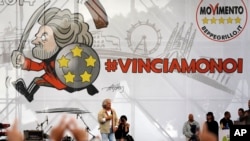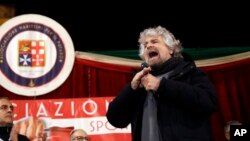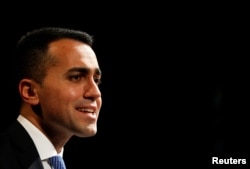Five years ago the maverick, anti-establishment Movimento 5 Stelle, brain-child of the chaotic and shaggy-bearded stand-up comic Beppe Grillo, exploded on the Italian electoral scene, grabbing sufficient seats to force Italy’s established parties to form a ‘grand coalition’ government to shut out the political upstarts.
Despite being accident-prone and mired suddenly in scandal, the Five Star movement, or M5S, is being tipped to improve on its 2013 election performance. It is likely to emerge from polls on March 4 as the country’s largest parliamentary party.
That wasn’t the plan of ‘establishment’ politicians.
WATCH: Ending Ugly Campaign, Italy Prepares for Difficult Vote
They enacted a byzantine electoral reform designed to favor parties willing to campaign together, or ones that are geographically concentrated, hoping to offset the growing but diffuse popularity of M5S.
But public polls published before the shut-off date of February 15 - like several European countries opinion surveys are banned in the final electioneering stretch - suggest the reform will fail to snuff out a movement that not onlythreatens to upend the old political order but is viewed in Brussels as a menace.
M5S continues to enthuse a large proportion of Italian youngsters fed up with high youth unemployment, poorly-paid short-term jobs and a culture of impunity that has allowed elites to enrich themselves and escape punishment for graft.
But March 4 may be seen later as the high-water mark for M5S.
Launched only nine years ago by the eccentric and often foul-mouthed comic and blogger Grillo, M5S rapidly attracted the support of young web-based activists who embraced the comedian’s idea of ‘direct democracy,” an idealistic virtual permanent ‘town hall’ with citizens using the internet to have their say directly on policies, stripping decision-making from elected politicians.
With a less than week to go before voting, tensions are mounting within M5S between purists vehemently opposed to joining any governing coalition and pragmatists, who argue the movement needs to grow up and move away from wanting to crash Italy’s political system and to start afresh.
Much of M5S’s staying power this election cycle can be put down to its candidate to be prime minister, Luigi Di Maio, a suave, boyishly telegenic 31-year-old, who despite his inexperience and bare resume has done much to start the process of tempering MS5’s iconoclastic image. He even rejects a populist label, seeking to broaden the movement’s appeal.
With his coiffed hair, easy manner and well-tailored suits, he’s a remarkable contrast to the movement’s brooding and unkempt founder. Not only does Di Maio look like the ‘establishment’ politicians he says he wants to replace; he can seemingly be as slippery.
“His strength lies precisely in being completely different from Beppe Grillo,” according to Alberto Castelvecchi, a professor at Rome's Luiss University.
Born in the south in the town of Avellino, Di Maio's father ran a small construction business and was a neo-fascist activist. Di Maio initially studied computer science at university in Naples, then switched to law, but never completed his degree. He held down a series of short-term jobs before he was unexpectedly elected in 2013 to parliament.
Some Italian commentators are skeptical that Di Maio is entirely his own man and question whether Grillo is acting as a puppet master, keen to mature the movement but not wanting to be seen as responsible for shifting it away from its more iconoclastic positions.
Was he chosen by Grillo because of “his readiness to take orders and advice?" asked newspaper La Stampa recently.
The party used to call for Italy to leave the EU and the euro, but Di Maio has talked about remaining in the bloc. M5S has become increasingly anti-migrant, prompting the Catholic newspaper Famiglia Cristiana to complain that he is like “a surfer riding a wave.”
On the campaign trail, Di Maio has repeatedly insisted M5S can emerge as the majority party.
But in January the movement quietly shelved a stipulation that would have ruled out joining any kind of post-election coalition. And Di Maio has introduced into his speeches a new formulation, saying that in a hung parliament, he would invite other parties to support an M5S administration on a pre-agreed program.
Post-election deal-making risks M5S losing its anti-establishment credentials — it also risks triggering internal turmoil and even defections from the ranks of its lawmakers.
Di Maio’s rivals smell an opening.
The most likely election outcome is that a rightwing electoral coalition pulled together by former prime minister Silvio Berlusconi will be able to form a government — but possibly only with the support of M5S, or with some of its elected candidates should they defect, something Berlusconi has been actively preparing for and encouraging.
The movement’s anti-establishment credentials — the idea that it represents a break with the past — has also been called into doubt by a series of scandals. Several of its lawmakers were found to have pocketed money from their parliamentary salaries they’d promised to donate to the movement. Some other candidates have figured in various fraud probes, the latest the president of a soccer club in Siena who’s accused of money-laundering.
Sone other M5S candidates have been expelled for being freemasons — a taboo in the party.
In all fourteen candidates have been ejected from M5S but their expulsions were too late for removal from the electoral lists and they could be elected as independents. The wily 81-year-old Berlusconi has offered them a home in his right-wing alliance.
“Our coalition would be very convenient for them since they could keep all their wages,” he quipped. Italian lawmakers are no strangers to swapping parties — one has switched parties ten times in the past five years.
The offer has prompted Di Maio to accuse Berlusconi of acting like a mobster.
“This behavior is worse than the Camorra,” he said in reference to Naples-based mob.








